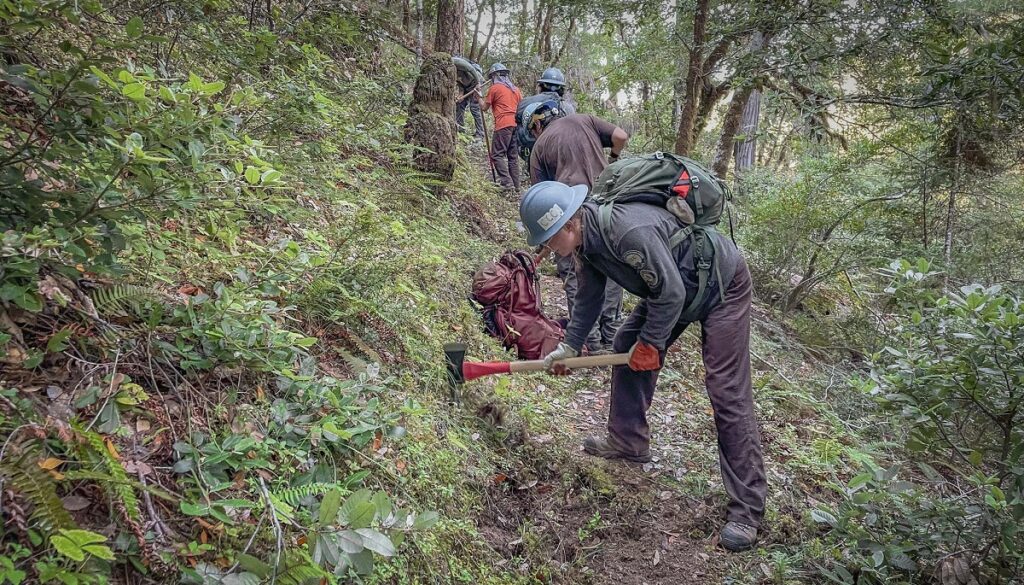Our Pledge
We believe that everyone deserves the opportunity to enjoy time outdoors. When people have meaningful experiences outdoors, their quality of life, health, and social well-being improve. We believe that everyone should have access to the Bigfoot Trail and feel welcomed in our trail community. We welcome diversity and aim to be an accessible and inclusive community that honors and respects the various ways people connect with the BFT.
What do we mean by diversity, equity, and inclusion (DEI)?
Diversity – understanding, appreciating, and embracing differences among people with respect to age, class, ethnicity, gender, health, physical and mental ability, race, sexual orientation, religion, physical size, education level, job level, veteran status, personality traits, and other human differences.
Equity – acknowledging and dismantling barriers to create conditions that allow every- one to reach their full potential. This means actively elevating individuals that are tradi- tionally underrepresented so that all people can recreate, volunteer, and enjoy the BFT.
Inclusion – an inclusive organization/ trail community promotes and sustains a sense of belonging where the inherent worth and dignity of all people are recognized.
What does DEI and racism have to do with the BFT and BFTA?
Guided by our mission and vision, we value trails and non-human nature, but also people and communities. As people within our trail community, we all have different lived experiences both on and off the trail that are influenced by race, gender, sexual orientation, age, physical/mental ability, socio-economic status, and many other visible and invisible identities. The BFTA is committed to listening to, understanding, and welcoming all these experiences as we support a more inclusive culture. It is, however, important to look specifically at race in the outdoors and in our BFT community as we think about diversity, equity, and inclusion.
According to the U.S. Census, people of color make up 40% of the U.S. population and that percentage is expected to grow. People of color do not use regional trails including the BFT in numbers anywhere near that percentage. Why?
The answer is much deeper than economic disparities, which can financially limit access to the BFT. The history of the United States is marred with racist beliefs and oppressive systems that exclude certain groups from experiencing the many joys our country has to offer. The history of the environmental movement is no different. While we acknowledge the important accomplishments of early conservationists, we recognize their legacy is built upon the forced removal of Indigenous people from their ancestral homelands. As another example, for many years segregation laws prevented Black people from accessing parks, campgrounds, beaches, and trails in the same way that white people have always been able to.
We have heard from Black, Indigenous and People of Color (BIPOC) members that the continued emphasis on white people and their perspectives on public lands and the outdoors have made many feel unwelcome and unsafe in these spaces. BIPOC and other marginalized individuals frequently find their experiences, perspectives, and voices silenced.
Commitments and Next Steps
1. Recruit and support a diverse volunteer base and board. This may include:
- Publicizing volunteer opportunities and internships to underrepresented populations in our region.
- Considering diversity, equity, and inclusion (DEI) issues in our planning and programming.
- Building a Board that supports challenging conversations about DEI.
2. Present representative marketing when we promote the Bigfoot Trail. This may include:
- Showcasing stories that break the mold of the “typical” outdoor user. People feel invited into the outdoors when they see themselves in stories, articles, photos, and promotion. In helping evolve an outdoor media landscape that is overwhelmingly white and male, we invite new users into the outdoors, and support those who are already there.
- Supporting underrepresented voices and stories in the outdoors to provide the next generation a collection of role models who represent all backgrounds, and remind them that they, too, can excel and be welcomed in the outdoors.
3. We will share our commitment with other trail organizations and develop partnerships that promote equitable access to the Bigfoot Trail and public lands.

